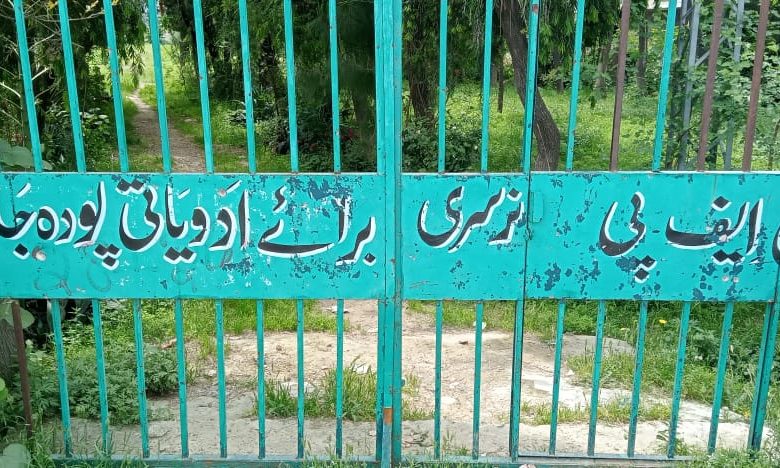
The Non-Timber Forest Produce (NTFP) plant nursery in the Bajaur district, once lush with mulberry, white poplar, and other medicinal plants, has been abandoned for the past four years. Instead of thriving plants, weeds now dominate the landscape. This not only deprives the local community of the opportunity to benefit from free plants but also undermines government efforts to mitigate the adverse effects of climate change.
Noorullah Khan, a resident of the historic village of Lashora in Tehsil Khar, reminisces about the nursery's former glory. Along the bank of their canal, ten canals of land are adorned with mulberry, cedar, eucalyptus, and Atlantis saplings, which have flourished into towering trees over the years. Noorullah recalls receiving mulberry saplings from the NTFP nursery eight years ago, provided free of charge upon presenting a copy of his ID card.
Located just one kilometer from his village, the nursery was easily accessible for Noorullah and his fellow villagers. They would eagerly visit every spring to obtain saplings. However, Noorullah now laments the nursery's recent neglect, as he, like many others in the village, relies on this free resource for their greenery. As a working man, purchasing plants from a private nursery is not feasible for him.
Established in 1985, the NTFP nursery in Bajaur boasted eight kanals of land dedicated to cultivating hybrid mulberry plants on a large scale. It employed six permanent staff members along with seasonal workers on contingent wage contracts. As the first nursery of its kind in Bajaur, it played a crucial role in producing a substantial stock of mulberry plants, essential for silk farming. Additionally, the nursery distributed beehives and mushroom seeds to interested landowners annually, further contributing to local agriculture.
However, since the merger of the tribal districts with Khyber Pakhtunkhwa province, the nursery has faced financial constraints. Gul Badshah, an official from the NTFP Department in Bajaur, explains that the lack of funds has halted plant cultivation in the nursery and stalled other projects. Despite repeated appeals to higher authorities for funding, the department remains in limbo, awaiting financial support to resume its activities.
Salah-ud-Din, a resident of Bad-e-Samoor village in Inayat Kaly, reflects on the promising mushroom cultivation program initiated in the area. While their initial attempts did not yield the expected income, the experience gained in mushroom spawning and care has been invaluable, paving the way for future success.
We acquired knowledge about the ideal temperature for mushroom growth and mastered the process of seed preparation and packaging in plastic bags. Regrettably, the discontinuation of the mushroom cultivation program by the nurseries renders our expertise futile.
Salah-ud-Din appeals to the government to revitalize the nursery in a modern manner, offering new job opportunities along with plant and mushroom seeds to benefit the local community. He emphasizes the need for proactive government intervention to address the closure of the NTFP nursery, attributing it to governmental neglect and contradicting its purported commitment to combat climate change.
Recognizing Pakistan's economic constraints, Naimatullah underscores the importance of tree plantation as a cost-effective strategy to mitigate climate change's adverse impacts, especially amidst rising temperatures in Bajaur.
Naimatullah highlights the alarming increase in temperatures in Bajaur Khar, emphasizing the crucial role of trees in moderating temperatures and enhancing environmental comfort. He urges the government to promptly reactivate the closed nursery and establish new ones at the tehsil level to counteract the detrimental effects of climate change on human and animal populations, as well as agricultural yields in Bajaur.
Gul Badshah elaborates on the challenges faced by the nursery, citing a shortage of funds and staff. The nursery's operations are severely hindered with only one watchman currently employed and the remaining staff retired without replacements. However, he remains hopeful that the new government will allocate funds for the development programs in the merged districts, thereby resolving these issues.